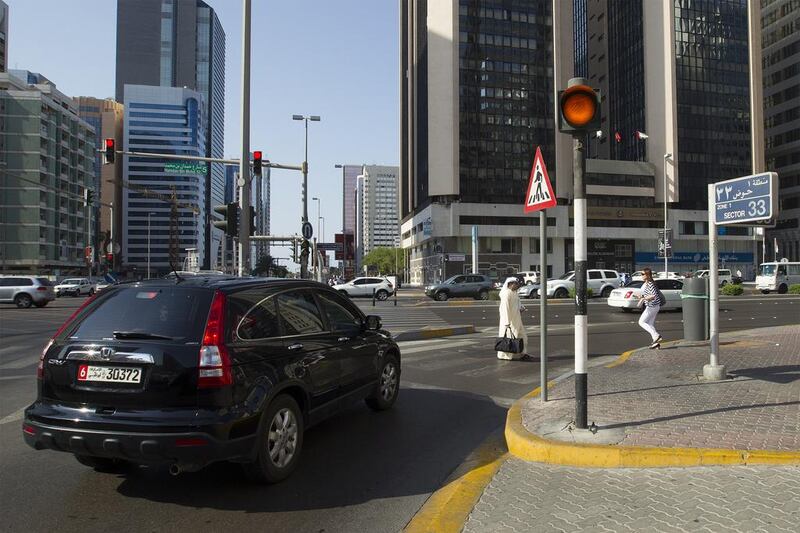ABU DHABI // A central traffic control system will be installed with sensors “counting” the volume of vehicles at signals to improve traffic flow at the capital’s 125 main junctions.
It will ensure better management of the road network and reduce congestion, the Department of Transport announced on Tuesday.
Work on the Dh33 million project began in January and is expected to be completed by the first quarter of next year. It is in line with the Surface Transport Master Plan and Abu Dhabi 2030 Vision to be one of the world's top governments and destinations.
The project involves implementing a system called Scoot (Split Cycle Offset Optimisation Technique), a tool for managing and controlling traffic systems in urban areas, which is used in more than 120 countries.
“It is simply to have the most adaptive technology to manage the traffic network in the proper way,” said Salah Al Marzouqi, director of the integrated intelligent transport systems division at the Department of Transport.
“What is happening now on the island of Abu Dhabi is that most of the traffic signals are working on fixed times which are not suitable for sudden traffic congestion related to an accident, any event or change to the traffic situation.”
The new system is smoother, more flexible and able to respond to the traffic flow, using about 20 sensors at each intersection to monitor and report the volume of traffic.
“The sensors will detect the flow, the number of cars on each approach and the cruise speed or the average speed towards a traffic signal,” said Abdulkader Ahmed, a senior ITS engineer at DoT.
“Scoot will calculate all these variables and predict when the platoon or a group of cars will arrive at the intersection, and optimise it in a way that the platoon gets through the green signals to ensure smooth travel and reduce stops and delays.”
This new adaptive traffic control system will link Abu Dhabi’s traffic control with other systems in Al Reem, Maryah and Yas islands, Mr Al Marzouqi said.
“Information will be shared between the new system and the systems of the other islands, with each system taking its own decision to manage traffic,” he said.
Statistics have shown the new system will result in improved traffic flow by between 5 and 25 per cent, said Abdulla Al Hashimi, a traffic system engineer and project manager at DoT.
It has built-in capabilities to give priority to public transport vehicles such as buses, ambulances and emergency vehicles.
Bus services will become quicker and more reliable as a result of the controlled traffic signals.
“If a bus is delayed for five minutes, there is a device inside it which transmits a signal to the controller at the intersection about the delay,” Mr Al Hashimi said. “The signal timings are optimised to benefit the bus, giving it a green light.”
The system is capable of responding to the quick variations in traffic flows by reducing delays and queue lengths at junctions, which will enhance road safety and quick response to accidents and vehicle breakdown on the roads.
“Aggressive driving is often a result of people being stuck in traffic,” Mr Al Hashimi said. “We can enhance road safety by deploying these intelligent systems, including sending traffic information to the people of the accident locations and traffic jams and warn them to be cautious on the road.”
The implementation of the project coincides with the Dh16m renovation of the traffic management centre set up in the mid-1980s.
The centre manages monitoring of the traffic flows on the road network, operation of the central traffic control system, and offers road service support patrols to prevent any congestion.
rruiz@thenational.ae






